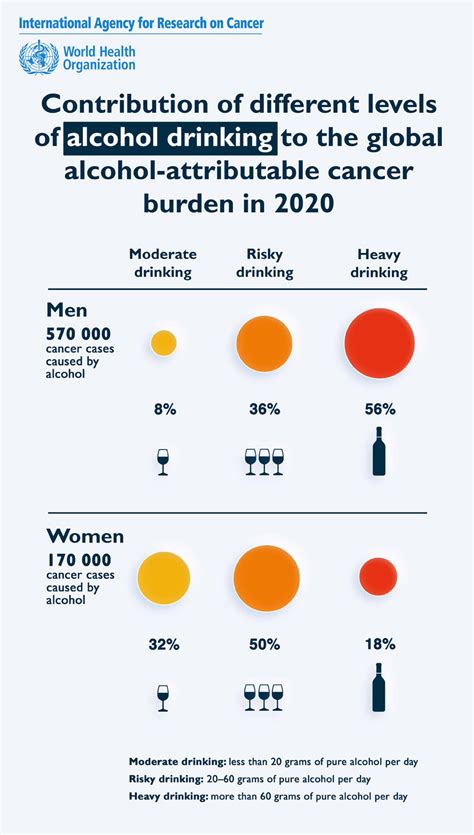Alcohol consumption has been a longstanding aspect of human culture, with many individuals enjoying alcoholic beverages as part of social gatherings, celebrations, and everyday life. However, the relationship between alcohol and health is complex, and one of the most significant concerns is the link between alcohol consumption and the risk of developing various types of cancer. The International Agency for Research on Cancer (IARC), which is part of the World Health Organization (WHO), classifies alcohol as "Group 1," meaning that it is considered carcinogenic to humans. This classification is based on evidence that alcohol consumption is associated with an increased risk of several types of cancer.
Primary Alcohol-Related Cancer Risks

Research has identified several types of cancer that are directly linked to alcohol consumption. These include:
- Liver Cancer: Alcohol is a major risk factor for liver cancer, particularly hepatocellular carcinoma, which is the most common type of liver cancer. Chronic alcohol consumption can lead to liver cirrhosis, a condition characterized by scarring of the liver, which significantly increases the risk of developing liver cancer.
- Breast Cancer: There is evidence suggesting that alcohol consumption, even at moderate levels, may increase the risk of breast cancer in women. The exact mechanism is not fully understood, but it is thought that alcohol may affect hormone levels, including estrogen, which can promote the growth of breast cancer cells.
- Colorectal Cancer: Alcohol consumption has been linked to an increased risk of colorectal cancer, which affects the colon or rectum. The risk appears to be dose-dependent, meaning that the more alcohol consumed, the higher the risk of developing colorectal cancer.
- Esophageal Cancer: Alcohol, particularly when consumed in large amounts, is a significant risk factor for esophageal cancer, especially a type called esophageal squamous cell carcinoma. The risk is further increased when alcohol consumption is combined with smoking.
- Oral and Pharyngeal Cancers: Alcohol consumption is also associated with an increased risk of cancers of the mouth, throat, and voice box. As with esophageal cancer, the combination of alcohol and tobacco use significantly increases the risk of these cancers.
Mechanisms Behind Alcohol-Related Cancer Risks
The exact mechanisms by which alcohol increases cancer risk are complex and not fully understood. However, several factors are thought to play a role:
- Acetaldehyde: When alcohol is broken down in the body, it is converted into acetaldehyde, a toxic compound that can damage DNA and lead to cancer-causing mutations.
- Oxidative Stress: Alcohol metabolism can lead to oxidative stress, a state characterized by an imbalance between the production of reactive oxygen species (free radicals) and the body’s ability to detoxify these harmful compounds, leading to cell damage.
- Hormonal Effects: Alcohol can affect hormone levels and metabolism, which may influence the growth and division of cells, potentially leading to cancer.
- Nutrient Deficiencies: Chronic alcohol consumption can lead to poor nutrition and deficiencies in essential vitamins and minerals, which are important for maintaining healthy cells and preventing cancer.
| Cancer Type | Relative Risk with Alcohol Consumption |
|---|---|
| Liver Cancer | 2.5-fold increase with heavy drinking |
| Breast Cancer | 1.1-1.2-fold increase with moderate drinking |
| Colorectal Cancer | 1.2-1.5-fold increase with heavy drinking |
| Esophageal Cancer | 5-7-fold increase with heavy drinking and smoking |
| Oral and Pharyngeal Cancers | 2-3-fold increase with heavy drinking and smoking |

Key Points
- Alcohol consumption is a known risk factor for several types of cancer, including liver, breast, colorectal, esophageal, and oral/pharyngeal cancers.
- The mechanisms behind alcohol-related cancer risks include the formation of carcinogenic compounds during alcohol metabolism, oxidative stress, hormonal effects, and nutrient deficiencies.
- The risk of cancer associated with alcohol consumption is dose-dependent, with heavy drinking posing the greatest risks.
- Combining alcohol with tobacco use significantly increases the risk of certain cancers, such as esophageal and oral/pharyngeal cancers.
- Public health strategies and individual responsible drinking habits can help mitigate the risks of alcohol-related cancers.
In conclusion, the relationship between alcohol consumption and cancer risk is complex and multifaceted. Understanding the specific cancer risks associated with alcohol, the mechanisms by which these risks are increased, and the importance of responsible drinking habits can help individuals make informed choices about their alcohol consumption. Moreover, public health initiatives aimed at reducing alcohol consumption can play a critical role in decreasing the incidence of alcohol-related cancers globally.
What are the most significant cancer risks associated with alcohol consumption?
+The most significant cancer risks associated with alcohol consumption include liver, breast, colorectal, esophageal, and oral/pharyngeal cancers. The risk of these cancers increases with the amount and frequency of alcohol consumption.
Can moderate alcohol consumption increase the risk of cancer?
+Yes, even moderate alcohol consumption has been linked to an increased risk of certain cancers, such as breast cancer. However, the risk is generally lower compared to heavy drinking.
How can individuals reduce their risk of alcohol-related cancers?
+Individuals can reduce their risk of alcohol-related cancers by practicing responsible drinking habits, such as limiting the amount of alcohol consumed, avoiding binge drinking, and not combining alcohol with tobacco use. Additionally, maintaining a healthy diet, staying physically active, and avoiding known carcinogens can help reduce overall cancer risk.



